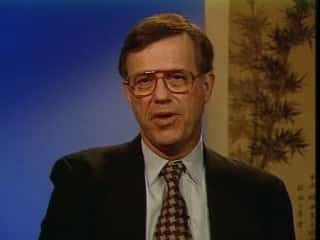Playlist: China and the “Axial Age”
100 Schools of Thought in China and the World’s Axial Age
Transcript
Robert Oxnam: This period of political unrest in China was also one of great intellectual activity; it is often referred to as the period of "100 Schools of Thought." Curiously enough, this kind of philosophical speculation was occurring at this time not only in China but also in other civilizations around the world. Many of the religions and philosophies still dominant today were first articulated during this era. The period in which Confucius lived has therefore been called by some scholars the "Axial Age," indicating a turning point in world history.
Karl Jasper's called this period the "Axial Age," which he said turned on a historical axis of the year 500 BCE.
The Axial Age in the Ancient World
Transcript
Irene Bloom: Karl Jaspers, the German philosopher, writing in our own time — actually writing just in the middle of the twentieth century — in a book called The Origin and Goal of History, has an opening chapter which is called the Achsenzeit, the "Axial Age." Jaspers noted, really to his amazement, that in this same period, just in the period within which Confucius was living in the sixth, fifth centuries, an amazing series of developments were going on within the ancient world.
Robert Oxnam: This period of time, spanning roughly the eighth to the third centuries before the Common Era, was the age of the prophets in Israel and of the philosophers Socrates, Plato, and Aristotle in Greece; it was the time when the classical Hindu texts, the Upanishads, were written; and it was a time when the historical Buddha, a contemporary of Confucius, lived in India; and when Laozi, the philosopher whose ideas became what is called Daoism, lived in China. Karl Jaspers calls our attention to the commonalities of these developments in so many parts of the world
Figures who lived between 800-200 BCE
- Israel: Isaiah (770-700 BCE), followed by the “Age of Prophets,” (650-500 BCE)
- Greece: Socrates (469-399 BCE), Plato (427-347 BCE), Aristotle (384-322 BCE)
- Iran: Zoroaster (ca. 600 BCE)
- India: Buddha (563-483 BCE), the Hindu Upanishad texts written (ca. 550 BCE)
- China: Confucius (551-479 BCE), Laozi (605-530 BCE)
About the Speakers
Irene Bloom
Anne Whitney Olin Professor Emerita, Columbia University
Robert B. Oxnam
President Emeritus, Asia Society




